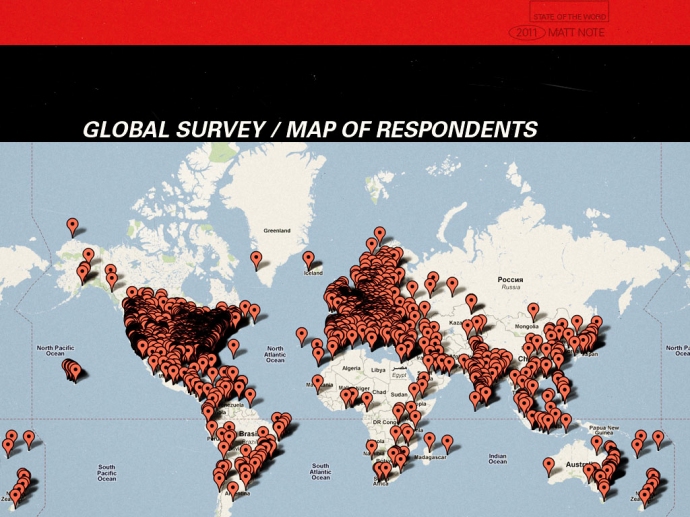What’s Going On In The WordPress Economy?
In a post on her blog last year, WordPress designer, business woman and author Lisa Sabin Wilson, talked about how thankful she is to be part of the WordPress economy. It’s an economy that thousands of people, the world over, are benefiting from (including me!). It is an economy built on free, open source software. In this article I’m going to talk to people who are active in the WordPress economy, people from all over the globe. It’s amazing to see how even in the past few years the economy around WordPress has grown, and what new, innovative, enterprises it’s composed of.
Further Reading on SmashingMag:
- Making A WordPress Plugin That Uses Service APIs
- WordPress Essentials: How To Create A WordPress Plugin
- Guide To WordPress Coding Standards
- Writing Unit Tests For WordPress Plugins
Contents
This is a long, two-part article so if you want to get where you’re going quickly, these are the sections:
The Stats
Last year WordPress carried out a global survey, asking basic questions about what people are doing with WordPress. Over 18,000 people responded from all over the world, making it a good indicator of how people are faring in the WordPress economy. Here’s the global map of the respondents:
You can check out the results in detail by watching Matt Mullenweg’s State of the Word address from 2011. Let’s take a quick look at some of them:
- 53% of respondents described themselves as WordPress developers.
- 36% described themselves as self-employed WordPress developers.
- 170,000 websites had been built by survey respondents.
- 61% of respondents use WordPress just as a CMS, 31% as a CMS and a blog, and only 8% as just a blog.
- Respondents reported being paid between $5 - $2000 per hour (sadly, the $2,000 per hour report is not from me).
- The average hourly rate is $58 and the median is $50.
- 2,800 people use WordPress as their primary source of income.
Those are some exciting stats. And with 14.7% of the internet running WordPress, and 22% of new domains running on WordPress (as of August 2011) we can expect exponential growth.
Before we get to the people using WordPress, let’s hear from the two guys responsible for its creation.
Some Words From The Founders
Way back in 2003 (feels like a century in internet terms), Matt Mullenweg expressed his frustration with b2/cafelog and wondered if it was time to fork it. Mike Little commented about this, and WordPress was born.
It’s an important moment for all of us who make our livelihoods from WordPress; people like me who get to wear pajamas all day while meeting awesome people from all over the world.
I asked Matt and Mike some questions about the WordPress economy. Here’s what they had to say:
When you first talked about forking B2, could you have imagined where it would end up?
Matt:
“Not in a million years.”
Mike:
“No, not at all. We were really just looking to fix some bugs and add some improvements to our blogging software.I was also interested in getting involved in another open source project. I’d been on the fringes of a few different ones over the previous few years, MySQL, CVS, Cygwin, and others, but mostly bug reporting and forum / mailing list support.
So I thought this would be a good opportunity to really get stuck into a project. I had already been providing people with code and other solutions in the forum (as had Matt), and had already written a couple of extensions for B2/Cafelog and bug fixed / modified a few more.”
WordPress provides people with jobs all over the world, and is the foundation for hundreds of businesses. How does it feel to have been a catalyst in that?
Matt:
“We know of tens of thousands of people directly making their living from WordPress, and probably many more indirectly. I think when this community coalesces around a cause, like improving core WP development or charity work, it’ll be something to see.”
Mike:
“It’s not something I’d thought about too much until recently. I was more interested in the fact that WordPress empowers so many people to have a voice on the internet.But when some of the results from the big WordPress survey started filtering through last year, I began to realize just how big the economy around WordPress had grown.
And I feel great about it. It is tremendously satisfying to know that I was involved in that at the start. It’s also a fantastic advert for the power of Free/Libre software: You can sustain an economy giving away the core product.”
The WordPress economy is booming and seems to be recession-proof. Why do you think that is?
Matt:
“WordPress is often replacing an existing proprietary or inflexible CMS, usually at a tenth of the cost. People want more direct control over their websites.”
Mike:
“Firstly, because WordPress is so very flexible: It means that the same product can be used as the basis for a wide range of jobs, from a simple ‘make me a website’ that might be as little as $25 or $50 and something a relative beginner can do, to complete customised, complex, fully functional, corporate websites that might run up to a $150K+ build for a big agency.Secondly, because it’s simple enough that many people can get started in a career built around WordPress, yet powerful enough that the most sophisticated websites; those that require highly skilled and experienced teams, can be built with it.
Thirdly, it fits in extremely well with the whole internet-based economy thing. Everyone from designers to marketeers, SEO experts to entrepreneurs (and many others), can do what they do best without having to worry about the building-the-website part, or having to learn many skills that are unrelated to their main skills.”
That’s what the the guys behind WordPress had to say. Now it’s time to hear from people who have built businesses around WordPress—people long-established, as well as those who are just starting out.
Reading through them, you’ll see a pattern emerging. Many came from a personal need, and transformed that need it into a business. It’s this prescience that makes so many of them successful.
Themes
Theme Shops

Allure Themes offers WordPress themes for women.
The first type of business that springs to mind when thinking about WordPress is the theme shop. Think theme shop and names like WooThemes, Elegant Themes, Thesis and StudioPress all immediately spring to mind. But there are 100’s of WordPress theme shops. This post lists only 90 of them, but I can think of countless more that aren’t included on this list.
Theme shops are based all over the world. From my own personal experience I’ve worked with theme shops in America, the Far East, the Middle East and Europe, and that’s just me and my little business. The theme shop market is saturated, but that doesn’t stop new theme shops from popping up all the time.
I talked to Lisa Sabin Wilson, who launched her own theme shop Allure Themes last year. I asked Lisa whether theme shops, in such a competitive market, continue to be a viable model for WordPress startups. Here’s what she had to say:
“The fact is, it’s not as easy to put a theme shop up on the Web and start selling themes as it was 2-3 years ago. The internet is flooded with WordPress theme shops these days and you’ve got your big names as well as a smattering of younger, smaller groups trying to make it happen. I think a niche shop that targets a particular industry or demographic will help you standout in the crowd, or try tapping into existing marketplaces by offering child themes for the popular theme frameworks like Builder, Headway or Genesis. Those markets have hundreds and hundreds of users, and people like the variety and choice.”
It has become much more difficult to launch a theme shop, but that doesn’t make it impossible. If you’re thinking of launching a theme shop, Lisa has this advice:
- Recognize that it’s going to be a slow process. It may take several months to a year before you start seeing a decent return for your work.
- Have a strong marketing and PR plan in place to make sure you get noticed.
- Approach WordPress news sites such as WPCandy and WPMU.org for coverage of your new venture.
- Have drive and passion; eventually if your work is good, you’ll get noticed.
Theme Marketplace

Shopping for themes in the marketplace (image CC license Michael Osmanda)
A Theme Marketplace is a variation on a theme shop. While a theme shop sells themes that it has developed in-house, a marketplace provides a platform for designers and developers to sell their themes, while the marketplace takes a cut. The most well-known of these is Envato’s Theme Forest. However, it’s by no means the only theme marketplace around, with Theme Garden currently undergoing a redesign and Mojo Themes going strong.
I spoke to JR Farr who first came up with the idea of a theme marketplace back in 2006 (but at that time he was unable to get it off the ground). Later he teamed up with his co-founder to create MOJO Themes. I asked him how he felt about competing with such a huge company such as Theme Forest:
“The network that the Envato crew has built is amazing and we have so much respect for them. They do a great job over there. It’s been exciting to compete and personally I think the competition is good. It brings innovation and also keeps things in check.Since day one we’ve had the same goals in mind and we’ve tried to stick to being consistent with those goals. We try to just focus on what we’re doing and being the best at that. The last two years we had a few growing pains and we also unveiled some features in our marketplace no one else has, like JOINT FORCES.”
They have grown every month since launching: new users, new items, higher sales and higher payouts. This has meant that their team has had to grow, with the marketplace expanding to make sure everything gets done. Now in their third year, the growth rate is getting even higher. In 2011 alone they tripled in size. They’re hoping to expand their Mojoness network and look into customized solutions for new niches.
Theme Design
Theme design is one of the most in-demand WordPress skills. As long as people want gorgeous WordPress websites there’ll be a market for theme designers. Chris Coyier is a designer who has found himself reaching again and again to WordPress to power his clients’ websites.
I asked Chris about the difference between traditional Web design and designing for WordPress. As he pointed out, it’s rare these days for a website to run without a CMS, so we’ll soon be in a situation where traditional means a regular CMS design. Here’s what Chris said to keep in mind when designing for a CMS:
- As you’re designing around dynamic data, be sensitive to things like the fact that the size of an area can change depending on the amount of text.
- Remember that content creators may want to be able to customize different elements of their website.
- Be aware of how media integrates.
- The addition of a database means you need to consider page load speeds.
I asked Chris what a theme designer has to do to get ahead in a busy market:
“I know there are loads of small businesses trying to sell WordPress themes. So that market is pretty saturated and probably pretty difficult to get into. As with any other industry, getting ahead means competing on either quality or price. Since it’s hard to compete with free (what the majority of WordPress themes are), you gotta go for quality, and the bar is set pretty high there. If you are a freelancer, I think there is always room for good designers who are also good business people and know how to treat clients well, and deliver to them what they need.”
However, this busy market doesn’t mean that there is no room for new designers. More and more people are using WordPress, ranging from big corporate clients to small businesses and individuals. With the market constantly growing, there’s more scope than ever for a wide range of designers.
Theming Engine

The Infinity Theming Engine wants to give more power to WordPress (image CC license Trey Ratcliff).
As WordPress expands, the number of designers who want to design for it is growing. But not all of them have the skills necessary to make really complex websites. This means that developers are looking for solutions targeted specifically at making life easier for designers. The Infinity Theming Engine is about to launch. It seeks to differentiate itself from traditional WordPress frameworks by being a toolkit for designers. The developers describe it as “a powerful layer of re-usable and highly extensible theme development features that sits between WordPress and your theme(s), without locking you in to a specific design model.” It’s an engine because it adds additional power to WordPress and makes it easier for designers to design.
Rather than having a whole load of functionality stuffed into functions.php, Infinity uses a configuration file to let designers turn on and off whatever functionality that they need.
Infinity is being developed by developer Marshall Sorenson and designer Bowe Frankema. They’ve decided to adopt a Freemium model for when they launch it. Here’s what Marshall had to say:
“We’re the type of guys who are so obsessed with writing code and adding features, it took us a long time before we even got thinking about a business model. Our most important focus has always been making something that we could use for ourselves, and sharing it with the community. Luckily for us, there are a lot more WordPress devs who are in the same boat as us, and the rise of the ‘Freemium Model’ over the last two years, was a real outcome.”
The main product will be given away for free and the pair plan to monetize it by selling themes, extensions, installation and support services. This model has been tried with other traditional frameworks, so it’ll be interesting to see how it works with a different type of theme development tool.
I asked Bowe what he thought the benefit was of working with WordPress:
“Where to start? Seriously, these are very exciting times to be part of the WordPress community. There’s a flood of new people discovering WordPress every day, and they are welcomed by great resources across the Web to help get them started. There are WordCamps all over the planet, and it’s never been easier to start using WordPress.We’re blown away by the amount of interest we’ve seen for Infinity. We never expected the amount of attention we got from all kinds of people. It comes with some challenges in terms of documentation and managing expectations, but that’s a luxury problem, really. People want to use WordPress, are not afraid to try out new solutions to help solve their problems, and most importantly: they trust WordPress to power their websites/businesses. Without that trust, we (all the WP devs trying to make a living of doing the stuff they love) would be doomed from the start. Thank you WordPress Community :-) “
Plugins
Plugin Developer
The commercialization of plugin development has often proved to be a more contentious issue than the commercial theme market. A divide emerged between design and functionality, with WordPress users happy to pay for theme design but not for plugins. But that doesn’t mean that plugin development isn’t a lucrative and growing market, and some plugin developers have focussed their development efforts on a single plugin, and with great success. Seth Shoultes is the developer behind Event Espresso, an event management plugin for WordPress.
Event Espresso started out as a plugin that Seth developed for a family member. She needed a way for people to register for her online scrap-booking classes, and to let them make payments through her WordPress website. There wasn’t a plugin available, so Seth built Event Espresso.
Like many commercial plugins Event Espresso began its life as a free plugin in the WordPress repository. The support requests started to flood in. Like many plugin developers, he found it difficult to provide support, upgrades and development for a free product. It seemed like a good idea to start selling it on a plugin marketplace.
“We started off with one sale per week, then two and then a few per day, and it steadily doubled each month for about the first year. After about 12 months of growth our trend started to become more conservative, but consistent, so we’ve become more aggressive about marketing and releasing new products.”
In 2011, Seth entered the Utah Entrepreneur Challenge and after three rounds of judging was awarded the Grand Prize of $40,000. You can check out the ABC news item right here:
I asked Seth what the advantages are to being part of the WordPress economy. As well as mentioning the huge adoption rate of WordPress, he also said:
“The WordPress economy is innovative. Certainly developers have to function on the platform they’re given, but WordPress is open so they can change it and contribute to it. Yet within that framework you can find new and inspiring work daily. Some of that creativity can be monetized by the developer and sometimes it can’t, but in either case the WordPress community is pushing the envelope.”
Seth has big plans for Event Espresso, and in the coming years, hopes to see the plugin (which started out as a favor for a family member) become a foundation for expansion into larger and newer markets.
Services
WordPress Hosting

Servers the world over host WordPress (image CC license Skimaniac).
If you’ve used WordPress (and if you’re reading this, it’s probably safe to assume that you have), you know what an issue finding a good hosting provider can be. Late last year, Alex at WPShout published the results of his hosting review and the outcome was not great for the big hosting providers (Note: if you want to have your say about a hosting company, Joost de Valk is running a similar hosting survey on his blog right now). But what about finding a company that just provides WordPress hosting? That’s what the guys at WPEngine provide.
Like many of the other WordPress businesses I’ve talked about so far, WPEngine grew out of a need that the founder had himself. Jason Cohen had found that his blog would crash every time he hit the front page of HackerNews. He decided what he needed was an all-inclusive WordPress hosting package that would manage WordPress for him, and be able to handle high-traffic spikes.
After carrying out some market research, Jason decided to found WPEngine (his fourth startup!)
”‘Scratching your own itch’ is an awesome and typical way a company is started, but that’s the grain of sand, not the pearl. You have to go out in the field before you know whether it’s just a grain of sand. Remember, lots of ideas are good ideas but not businesses.”
Jason bootstrapped the company, making a profit after seven months. He then hired two more members of staff and turned a profit again in six months. Now their growth is exponential, increasing by double-digits every month.
If you keep your ear to the WordPress news wire, you’ll know that last year WPEngine received significant angel investment (you can check out their impressive list of investors here), including a major investment from Automattic.
“This is what fuelled our ability to grow, both on the customer-acquisition side and on the company-building side. Money in the bank means that we can hire ahead of need and test more marketing efforts in a shorter time, and put more money into whatever efforts are paying off.Perhaps equally useful is the guidance. I get different benefits from different investors—some help with the operational issues of scaling and projections, some are deep on certain kinds of metrics, some have started hosting companies and run them to massive scale and therefore can help on almost everything. In aggregate it has a massive impact on our success—there’s no doubt in my mind that without their help we wouldn’t be doing as well.”
With WordPress powering a significant proportion of the internet, there is scope for other hosting companies that just focus on WordPress. The market is huge, and the potential to create a successful company is massive.
“In a market that huge, of course there’s room for a ton of players, each contributing different benefits, different trade-offs. Sure we hope to be a major player, but we certainly have no interest in ‘killing’ competition. In fact we regularly refer customers to our competitors when we’re not a fit, and they’ll do the same.”
Jason sees the job of WPEngine to be as good as they can be for the corner of marketing that they are targeting. This means getting the balance right for both low-end and high-end customers. That said, they seem to be extremely successful at it, having just released support for servers in both London and Tokyo.
Consultancy

Everyone needs a little help from time to time (image CC license FuturePresent).
WordPress is easy to use, and it’s free, which means that the entry-level threshold of technical knowledge for people starting to use WordPress is always getting lower. This is great as it gives millions of people access to the Web, but once a users start digging under the surface of WordPress they soon discover that things aren’t so simple. On top of that, the plethora of plugins and themes available means it’s hard for an untrained eye to know where to start. This makes consulting an excellent opportunity for the WordPress-savvy.
I spoke to Mason James who provides WordPress consultancy services. I asked him what being a WordPress consultant involves:
“For me, consulting is troubleshooting in advance. A good consultant obviously has to have a thorough understanding of existing plugins and themes as well as what’s in the pipeline for WordPress itself, but also a keen sense of business strategy. This knowledge and experience helps a consultant to see down the development path and provide a clear guide in terms of using solid foundational products and avoiding the common pitfalls faced by WordPress-based businesses.”
This balance of having technical knowledge and business sense is essential for a good consultant. Mason operates by focusing his clients on their goals, and trying to build a business strategy around that. He helps them to set benchmarks, and creates a map around that benchmark of achievable goals. Anything that’s not relevant to their goals gets set aside. With a lot of startups he’s found that an unclear direction leads to feature creep and a delayed release. These are the pitfalls that a consultant is there to help prevent.
I asked him what the best and worst things about working within the WordPress economy are:
The best:
“The best thing about working in the WordPress Economy would have to be the tremendous amount of resources, support, and knowledgeable folks out there to pull from. I’m still discovering great sources of information and it’s growing all the time.”
The worst:
“I would say the worst aspect of the economy would be that the open source aspect can sometimes confuse folks on the value of it. They can get a website up and running quickly at only the cost of the hosting. Because of this some tend to be tighter with their wallets when it comes to getting expert advice or development. It’s not a huge issue, but for example, there is a difference in salary between a WordPress developer and a Drupal developer.“
Development Shop

You can build anything if you put your mind to it (image CC license xray delta one).
As well as there are businesses that just sell WordPress products, there are development shops the world over that are using WordPress to build large-scale (and small-scale) websites. Dave Coveney is the founder of Interconnect/IT, a UK-based WordPress development shop. The business started life as a technology and software consultancy firm, but they soon discovered that demand was starting to climb for WordPress. When Interconnect/IT marketed itself as simply a Web design and development studio it faced a lot of competition. But once it focused on WordPress it started to get the interest of larger potential clients.
I asked Dave if he has ever had any problems convincing his clients that WordPress isn’t a blogging platform. Here’s what he said:
“We took a lot of care to get known for what we could do with WordPress, released quite a few themes, and developed clever things to prove what we could do. When the likes of Telecoms.com or The Telegraph approached they needed strong and clear advice not on what WordPress was, but on where its limitations lay. That gave it credibility. And it’s a fantastic tool for websites with a content stream, and for simple brochure websites.”
That’s not to say that Dave hasn’t thought about jumping ship from time to time. He’s tried out other CMS options, such as Drupal, and spent a month learning Ruby-on-Rails. But he’s always come back to WordPress for its ease with user training, performance and deployment.
“I always come back to WordPress feeling slightly guilty for cheating on it. However, I’m not married to WP, so it’s always worth always keeping options open.”
We are living in a time of global recession, but WordPress has thrived throughout this period. With low barriers to entry, and ease of use for non-technical people, it’s the smart choice for small businesses as well as big businesses. Dave pointed out that many of the large firms and organizations that they work with use Escenic, which is hugely expensive for just one license. For the cost of an Escenic license, a good WordPress developer “can deliver the moon on a stick.” This lets development shops like Interconnect/IT develop sophisticated websites for a fraction of the budget. As Dave pointed out:
“anything that saves people money will do well during a recession, and recessions tend to create innovation. The WordPress economy is a good example of this.”
Translation

Thinking about every language (image CC license Tico).
Living in a global market, a business can expand considerably by creating multi-lingual websites. ICanLocalizeprovides self-service translations for WordPress and other CMS. The company also makes WPML, a WordPress plugin that enables WordPress users to create multilingual versions of their websites
The man behind ICanLocalize is Amir Helzer. Like many developers, ICanLocalize grew from a need that he had himself: a small shareware business selling Web utilities. He had his website and programs translated, and that increased his revenue threefold. The process, however, was painful. He decided to create something that people would actually enjoy using. The company started as one person and has now expanded to five, and continues to grow. Now iCanLocalize is a recommended resource for iOS developers and serves major clients such as eBay.
ICanLocalize provides self-service translation but WordPress users have the added advantage of being able to use the WPML plugin to send WordPress content directly to translators.
“It’s all happening in self-service mode. We are a platform that connects certified professional translators with clients. Our philosophy is that the system should take care of all technical issues allowing translators to just translate, and clients to just push and receive what they need.”
I asked Amir about his work with WordPress, which provides about 30% of ICanLocalize’s business:
“WordPress users are exactly our target audience. They are typically smaller businesses and highly cost sensitive. However, everyone who takes translation work also requires quality, so this lets ICanLocalizes’ benefits shine.I feel that our involvement in WordPress has been a two-way street. We got a huge push from this mass exposure and we also helped WordPress mature into a completely multilingual CMS.”
Smashing Special: A Two-Part Series
Due to the length of the series, it was split into two parts:
- Part 1: What’s Going On In The WordPress Economy?
- Part 2: What’s Going On In The WordPress Economy?



 Flexible CMS. Headless & API 1st
Flexible CMS. Headless & API 1st






